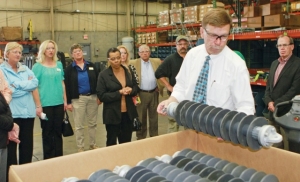IMPulse gets big contract
By Steve Herring
Published in News on April 12, 2015 1:50 AM

News-Argus/STEVE HERRING
Jeff Wharton, right foreground, IMPulse NC plant manager, shows some of the equipment manufactured at the plant to elected, business and civic leaders who were at the plant Thursday afternoon for the Stand Up for Transportation program.
MOUNT OLIVE -- The national economy stagnates, jobs are lost and there is no "future" without a strong surface transportation system, said Jeff Wharton, plant manager at IMPulse NC.
The company has firsthand knowledge.
IMPulse has landed a contract to do work on a 50-mile section of the California high-speed rail project.
"That is a huge job for us," he said. "That means we are going to grow this plant significantly, hire people to be able to build a 50-mile system because a typical system we do today is one to five miles."
The county has done jobs across the country, but this year projects have been "kind of hit and miss," he said.
"Right now, this year is terrible for us," he said. "There is such a slowdown of projects happening throughout the U.S. that we are at an all-time low. We have 20 employees here. Luckily we have a lot of sub suppliers to do a lot of our fill-in work.
"But we hope to be able to double, triple, quadruple our workforce here and it depends on transportation."
Wharton was speaking to elected, business and civic leaders who were at the plant Thursday afternoon for the Stand Up for Transportation program.
It was one of several hundred such events nationwide promoted by the American Public Transportation Association to draw attention to the nation's crumbling infrastructure and to advocate for the need for a long-term, sustainable, and reliable federal transportation funding bill.
On the national level a new analysis from the association shows that more than $227 billion in economic productivity is at risk to the nation's economy over the next six years without long-term federal investment in public transit.
The report also noted the nation faces a $160 billion backlog just to bring public transit and road systems into a state of good repair.
Founded in 1990, IMPulse occupies an approximately 45,000-square-foot facility where it does light duty manufacturing making the infrastructure support that provides power to street cars, light rail trains, trolleys and commuter lines.
"Anything that requires overhead electric power, we build that infrastructure to support the power lines that supply the trains," Wharton said. "So what is Stand Up for Transportation?
"This is a day of national advocacy that is happening all throughout the United States today. There are over 300 organizations that are raising the awareness of our surface transportation infrastructure and the situation that it faces with the lack of federal investment."
Without the infrastructure the "economy is going to stop," he said.
Wharton compared it to a home.
People invest in a home, but if they don't take care of the roof it is going to leak and damage the inside, he said.
"Then you have lost that investment," he said. "That is what is happening with our surface transportation here in the U.S. This function is being supported through the American Public Transportation Association. I am on the board of directors, and they are the national voice for public transit throughout the U.S."
The group is made up of more than 1,500 transit agencies and business members, he said.
Federal investment is "very important" to public transit, Wharton said.
The current bill that supports surface transportation expires at the end of May, he said.
"There is bipartisan support, people on both sides realize the importance of it," he said. "Finding the funding mechanism seems to be the big hurdle, but quite frankly that is why we voted officials to make those tough decisions to be able to continue to support our system."
Federal investment has been "around for a long time" in surface transportation -- for example, the transcontinental railroad during the time of President Abraham Lincoln on up to Eisenhower's interstate highway system, he said.
President John F. Kennedy came up with the mass transit funding mechanism that has been supported by presidents since then. President Ronald Reagan instituted a gas tax, he said.
"Without those functions there, we wouldn't have what we have today," Wharton said. "For every dollar the federal government invests in transportation, there is a $4 return in private investment which drives the economy.
"We are not looking to the federal government to fund 100 percent. We are looking them to provide the spark that then gets private groups, gets us, to make investments. Without investing in transportation we can't build our factories and employ the people and continue to make the investments to support it."
